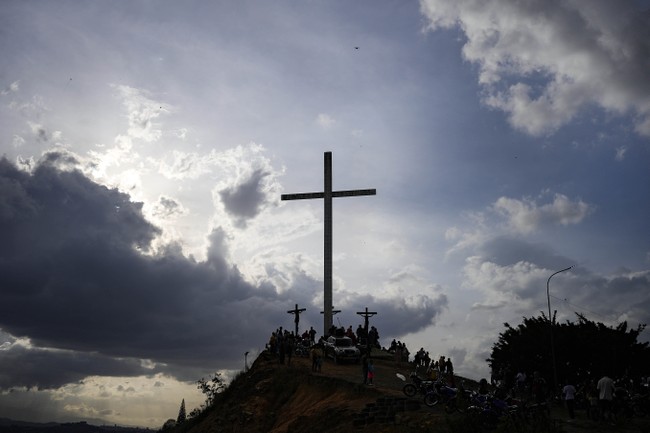
Christians all over the world are remembering Jesus’ sacrifice and death on the cross for our sins this Good Friday. One of the aspects of the crucifixion that people often study is Jesus’ words as he hung on the cross. One statement refers to Psalm 22:
Now from the sixth hour there was darkness over all the land until the ninth hour. And about the ninth hour Jesus cried out with a loud voice, saying, “Eli, Eli, lema sabachthani?” that is, “My God, my God, why have you forsaken me?” And some of the bystanders, hearing it, said, “This man is calling Elijah.”
Matthew 27:45-47 (ESV)
That’s a direct reference to Psalm 22:1, which reads, “My God, my God, why have you forsaken me? Why are you so far from saving me, from the words of my groaning?”
We see other places where Psalm 22 reverberates throughout the crucifixion narrative:
All who see me mock me; they make mouths at me; they wag their heads; “He trusts in the Lord; let him deliver him; let him rescue him, for he delights in him!”
Psalm 22:7-8 (ESV)
So also the chief priests, with the scribes and elders, mocked him, saying, “He saved others; he cannot save himself. He is the King of Israel; let him come down now from the cross, and we will believe in him. He trusts in God; let God deliver him now, if he desires him. For he said, ‘I am the Son of God.’”
Matthew 27:41-43 (ESV)
…they have pierced my hands and feet…
Psalm 22:16b (ESV)
Now Thomas, one of the twelve, called the Twin, was not with them when Jesus came. So the other disciples told him, “We have seen the Lord.” But he said to them, “Unless I see in his hands the mark of the nails, and place my finger into the mark of the nails, and place my hand into his side, I will never believe.” Eight days later, his disciples were inside again, and Thomas was with them. Although the doors were locked, Jesus came and stood among them and said, “Peace be with you.” Then he said to Thomas, “Put your finger here, and see my hands; and put out your hand, and place it in my side. Do not disbelieve, but believe.” Thomas answered him, “My Lord and my God!”
John 20:24-28 (ESV)
…they divide my garments among them, and for my clothing they cast lots.
Psalm 22:18 (ESV)
And when they had crucified him, they divided his garments among them by casting lots.
Matthew 27:35 (ESV)
People often call Psalm 22 a prophecy of Jesus, and it’s true in a way but not true in another way. On a recent episode of The After Church Podcast, Kurt Petersheim and Trey Bailey of Eastridge Church talked about this psalm with Dr. Joshua Stewart, a professor of Old Testament at Luther Rice College and Seminary.
“When David wrote that, he’s not thinking about the person of Jesus necessarily,” Petersheim said, adding, “in God’s sovereignty that we can see the big picture being painted here of something more happening than just the words that Jesus said or just even what David wrote.”
“Let me make a statement, and you tell me if I’m right,” Bailey later suggested to Stewart. “It would be doubtful that David’s writing this going, ‘I’m thinking about Jesus.’”
“I would definitely say that,” Stewart replied. “I guess, like I said, this psalm is, you know, reused in a particular way to point to the death of Jesus and even the hope of the resurrection.”
Related: Maundy Thursday Prepares Us for the Cross and the Empty Tomb
We can still see the crucifixion as the fulfillment of Psalm 22.
“Crying out reflexively in agony with the words of this psalm shows that, as horrible as it is, it was all going according to plan,” John Piper said last year. “All of it was the fulfillment of Scripture — even the worst of it was the fulfillment of Scripture. And that moment was probably the worst moment in the history of the world. And it was Scripture fulfilled.”
But the most important thing about Jesus’ quotation of Psalm 22:1 is that His death and resurrection meant that no believer has to worry about God forsaking him or her.
“By Jesus recalling this and just the psalm as a whole is the case I’m making for it, is that Jesus is saying, ‘I’m going to experience this for you in such a way that no other child of God will ever have to experience this for themselves,” Stewart said.
“If we could get that part of it where He is abandoned so that we will never be abandoned, He was forsaken so that we would never be forsaken,” he added. “Nobody ever needs to use these words again.”
That’s the beauty of Good Friday and Easter Sunday. Let that thought drive you to worship Him today and every day.
Here at PJ Media, we write a lot about truth — whether it’s the truth about what’s going on in the halls of power or timeless, eternal truth like Christianity. You can help us in our mission to report all kinds of truth by becoming a PJ Media VIP. Our members have access to exclusive content, podcasts, the comments section, and an ad-free experience; plus, PJ Media VIPs are investing in solid, truthful, conservative reporting.
There’s never been a better time to become a VIP because you can get 60% off when you use the code FIGHT.
















